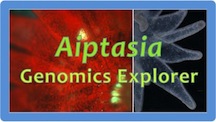Coral and Symbiosis Genomics
I am interested in understanding the genetic and molecular basis for coral symbiosis and reproduction. My lab is engaged in a number of research projects in these areas, as well as in pedagogical approaches to teaching genomics and bioinformatics.
Coral Reproduction Genomics
We are examining the genetic underpinnings of reproductive cycles in cnidarians by identifying cnidarian genes that exhibit cyclical patterns of expression correlated with the reproductive cycle, using RNAseq gene expression profiling approaches and exploring how reproductive cycles are perturbed by environmental stressors or endocrine disrupters. We are also examining the evolution of gene families of genes known to play roles in animal reproduction. With collaborators Virgina Weis, Eli Meyer, and Pat Chappell (Oregon State University), Tony Fan (NMMBA Taiwan), and Saki Harii (Sesoko Research Station University of the Ryukyus, Okinawa). Funding from NSF.
Cellular responses of cnidarians to symbiotic and pathogenic microbes
Under the growing stress to coral reefs from coral bleaching and disease, there is a critical need for understanding how cnidarians respond to the myriad of microbes they encounter in the marine environment, including pathogens and their own symbionts. Deciphering the cellular responses is of utmost importance to the study of symbiosis and pathogenesis in all organisms, and this project focuses on the nature of the cnidarian immune response and its role in the establishment and maintenance of the symbiosis. With Morgan Mouchka (Cornell) and Erik Lehnert and John Pringle (Stanford) and funding from Research Corporation for Science Advancement Multi-Investigator Award.
Aiptasia holobiont transcriptomics
 Together with collaborators at Vassar, UCMerced, Stanford, and Oregon State University, we generated a DNA sequence resource for Aiptasia called AiptiasiaBase http://aiptasia.cs.vassar.edu/AiptasiaBase. With collaborators: Monica Medina and Shini Sunagawa at UC Merced, Virginia Weis at Oregon State University, John Pringle at Stanford University, Marc Smith, Vassar College. Funding from Vassar College Dean of Faculty Office.
Together with collaborators at Vassar, UCMerced, Stanford, and Oregon State University, we generated a DNA sequence resource for Aiptasia called AiptiasiaBase http://aiptasia.cs.vassar.edu/AiptasiaBase. With collaborators: Monica Medina and Shini Sunagawa at UC Merced, Virginia Weis at Oregon State University, John Pringle at Stanford University, Marc Smith, Vassar College. Funding from Vassar College Dean of Faculty Office.
Comparative lipidomics and proteomics of symbiosis
In this project we are exploring molecular changes in the proteome and lipidome associated with the establishment and breakdown of symbiosis. The proteome and lipid composition of both the host and the symbiont at different stages of symbiosis are analyzed using mass spectrometry. With collaborators Eric Eberhardt and Teresa Garrett (Vassar). With support from a Research Corporation for Science Advancement Multi-Investigator award.
Coral ecotoxicology
Copper is now the most common anti-fouling agent applied to ship hulls. Corals living in harbors are chronically exposed to dissolved copper. In this project we investigated the effects of dissolved copper and metal-contaminated sediments on gene expression patterns and DNA in Bermudian corals at the Bermuda Institute for Ocean Sciences. With collaborators Carys Mitchelmore at Chesapeake Biological Lab and Ross Jones at Australian Institute of Marine Sciences, and funding from BIOS Grant-in-Aid.
Bringing Big Science to Small Colleges
Undergraduate colleges face serious constraints in incorporating “big” science (which typically requires the resources of large research institutions), into discovery-oriented lab curricula. With funding from the Teagle Foundation, this project aimed to identify effective approaches to integrate the new interdisciplinary field of genomics into liberal arts education. Through a series of workshops centered on genomics curricula and pedagogical methodology, the project will support the development and testing of inquiry-based integrated instructional units (I3Us) that can be disseminated to other colleges. The collection of I3Us is availabled at SERC Genomics I3U Collection . With collaborators Lois Banta (Williams College), Susan Singer (Carleton College), Erica Crespi (Washington State University), Cathy Manduca (SERC), Ross Nehm (Ohio State University), and Lynn Caporale. Funded by Teagle Foundation. Banta et al, 2012 CBE-LSE.
Scaffolding Student Authentic Genomics Research in the Classroom
Engaging undergraduate students in authentic research in the classroom can enhance development of scientific thinking needed both for the scientific workforce and within the broader population. However, implementing research in the classroom is challenging. This project develops genomics activities that use web-based Genomics Explorers scaffolding to support student genomics research within a classroom setting. We developed and assessed Genomics Explorers that guide students through developing genomics research on two model systems: a plant (Chamaecrista fasciculata) and an animal (Aiptasia pallida).  Students who successfully engage in genomics research learn to: 1) define biologically interesting questions that can be addressed with genomics data, 2) relate a gene to biological function, 3) analyze genomics data, including quality, 4) develop a literature-based understanding of important quantitative approaches, and 5) test thoroughly a viable hypothesis by bringing together the literature, classroom knowledge, and analysis of data. With collaborators Susan Singer, Cathy Manduca, Sean Fox, and Ellen Iverson at Carleton College Science Education Resource Center. NSF # 0837375
Students who successfully engage in genomics research learn to: 1) define biologically interesting questions that can be addressed with genomics data, 2) relate a gene to biological function, 3) analyze genomics data, including quality, 4) develop a literature-based understanding of important quantitative approaches, and 5) test thoroughly a viable hypothesis by bringing together the literature, classroom knowledge, and analysis of data. With collaborators Susan Singer, Cathy Manduca, Sean Fox, and Ellen Iverson at Carleton College Science Education Resource Center. NSF # 0837375




